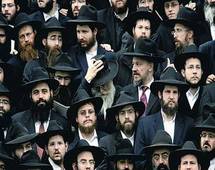Settlers poised to build despite 11th-hour bid to save talks
Michael Blum
REVAVA SETTLEMENT, Michael Blum - Jewish settlers in the West Bank signalled their determination to renew building on Sunday as a settlement freeze expired, despite diplomatic efforts to defuse a crisis facing renewed peace talks.
As the midnight deadline approached, Palestinian president Mahmud Abbas, who until now had vowed to abandon peace talks if Israel resumes building, stepped back from the brink, telling AFP in Paris he would meet top Arab diplomats on October 4 before deciding his next move.

"If Israel does not continue the settlement freeze, the peace process will be a waste of time," Abbas told Jewish leaders in Paris, hours before the Israeli 10-month partial moratorium was set to end.
Israeli Prime Minister Benjamin Netanyahu sought to calm tensions, urging settlers to display "restraint and responsibility" once the moratorium expires.
Netanyahu, who has so far refused to extend the freeze, was meeting on Sunday night with Defence Minister Ehud Barak to discuss possible compromise solutions, Israeli media reported.
The premier's office declined to comment on his activities as the deadline approached.
Barak returned earlier on Sunday from the United States where he had been engaged in efforts to find a way around the impasse.
Before leaving he told the BBC he was optimistic the direct talks that resumed at the beginning of the month would survive.
"I think that the chance of achieving a mutually-agreed understanding about moratorium is 50-50. I think that the chances of having a peace process is much higher," he said.
Israeli and Palestinian negotiators were believed to be still meeting in Washington.
US President Barack Obama's top policy adviser said Washington was still hopeful of brokering a compromise over the end of the ban on new building in the occupied West Bank.
"We are going to urge and urge, and push throughout this day to get some kind of resolution," David Axelrod told ABC News. "These talks themselves are absolutely crucial -- we're at a critical juncture in that region.
But efforts to keep the talks on track may depend on events on the ground.
This was highlighted by an attack in the West Bank late on Sunday, when suspected Palestinian gunmen opened fire on an Israeli vehicle, lightly wounding a woman, the military said.
The attack happened south of the city of Hebron near an area where four Israelis were killed in a similar shooting earlier in the month.
Keeping the talks alive will also depend on how successful Netanyahu is in controlling the settlers and members of his hardline coalition.
Around 2,000 people, including hundreds from Netanyahu's own right wing Likud party and a large contingent of flag-waving evangelical Christians, flooded into Revava settlement in the northern West Bank for a rally marking the end of the freeze.
Standing in front of a stage draped with a huge banner emblazoned with the slogan "We salute the pioneers of Judaea and Samaria," the crowds counted down from 10 to zero as the sun set over the rugged hills.
"The freeze is over," shouted Likud hardliner Danny Danon to roars of approval.
Earlier, settlers laid the cornerstone for a new nursery school in the nearby settlement of Kiryat Netafim in an event organised by Danon, a political hardliner but not a settler himself.
But settlers conceded there despite the symbolic displays, there was unlikely to be a flood of construction.
"We are getting back to business as usual and building but we will respect the prime minister's request," said David Ha'ivri, head of the Samaria regional council.
Speaking on condition of anonymity, settler sources told AFP they had been given the nod from the premier's office to start building -- but on condition they "don't make a big deal of it."
The freeze is generally accepted to end at midnight, when the settlers will be able to begin work on 13,000 new housing units, settlement watchdog Peace Now says.
Jewish settlements on occupied Palestinian land is one of the most bitter aspects of the conflict. Currently, around 500,000 Israelis live in more than 120 settlements across the West Bank and east Jerusalem, territories the Palestinians want for their promised state.
A previous round of direct talks collapsed in December 2008 when Israel launched a war on the Gaza Strip aimed at halting rocket attacks.
-----------------------------------------------------------------------------